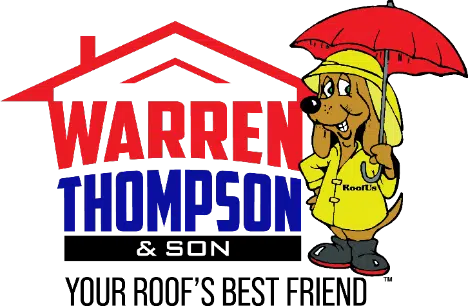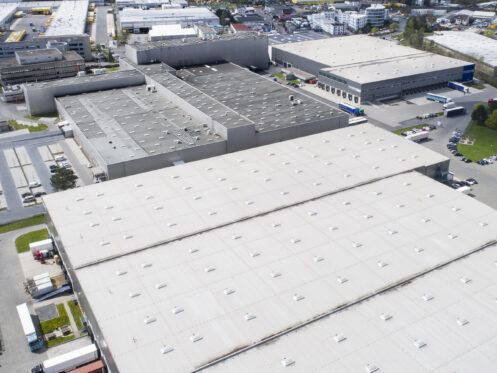Flat roofs are hardly rare in commercial building space. Their sleek, horizontal lines are visually appealing, while they provide dozens of practical benefits that can significantly impact your business’s bottom line. Cost advantages and design flexibility are two primary benefits of flat roofing systems, offering commercial building owners a wide range of other advantages that warrant further attention.
Here are a dozen reasons why a flat roof is a smart choice for your next commercial building project.
1. Cost Savings
Flat roofs offer considerable cost advantages during initial installation and over their lifespan. The simple design means less labor and lower material expenses when compared to pitched roofs with complex angles.
Moreover, flat roofs require fewer roofing elements because they’re not sloped. These systems provide a notable economic advantage, as well, by easing future upgrades or repairs. When you evaluate a flat roof against its pitched counterparts, the long-term financial rewards, including reduced maintenance costs, make it an appealing option for budget-conscious business owners.
2. Optimal Use of Space
A flat roof gives you valuable square footage that would otherwise go unused. This level surface offers the perfect platform for various functional enhancements. It also allows you to turn your roof into an environmentally sustainable green space where customers and employees can lounge and enjoy the view.
Flat roofs let you install HVAC systems without leaving them compromised on the ground or in your indoor space. The possibilities for maximizing space with this type of roof are numerous, as it offers benefits that pitched roofs cannot.
3. Energy Efficiency
Flat roofs are more energy efficient for commercial buildings. Their expansive, unobstructed surfaces are ideal for housing solar panels to lower energy costs and reduce reliance on conventional grid power.
What’s more, flat roofs include superior insulation to maintain interior temperatures. Their insulating qualities contribute to more consistent indoor climates and decreased demand on your heating and cooling systems. An energy-conscious design choice, flat roofs help lower utility bills while being kinder to the environment and improving your bottom line.
4. Ease of Installation
Flat roofs give you a straightforward design that simplifies the installation process. Unlike the intricate work required for pitched roofs, flat roofs take less time to construct. This expedited process saves time while reducing your labor costs.
Additionally, the materials for flat roof constructions are readily available, making the job easy to complete. Most commercial roofing professionals are skilled in flat roof installation. So, it is one of the most cost-effective solutions for your upcoming commercial build.
5. Low Maintenance Requirements
Flat roofs rank highly for ease of maintenance, which can be a boon for business owners looking to streamline the upkeep of their buildings. Their durability is attributable due to fewer seams and a sturdy construction, both of which are more effective at deflecting the elements.
When damage does occur, the flat terrain simplifies the repair process. It allows maintenance crews to quickly identify and address issues without the complications of steep slopes. Regular upkeep and scheduled tasks, such as cleaning, can extend the roof’s lifespan. The simple maintenance requirements ensure that minor issues can be resolved quickly before they can turn into costly repairs and business interruptions.
6. Improved Accessibility
Easy accessibility is among the favorable attributes of flat roofs. Their level surface significantly enhances safety for maintenance crews and inspectors. The flat surface provides secure footing and safer navigation across the roof.
This convenient accessibility is crucial for performing regular checkups and maintenance work without the safety risks that come with scaling a sloped rooftop. Routine tasks such as cleaning, repairs, and inspecting installations like HVAC units are, in turn, more efficient. This effectively reduces your downtime while allowing your building to operate at peak capacity.
7. Design Flexibility
Flat roofs offer a simple, blank canvas that can accommodate several unique architectural strategies from the outset. Moreover, as your business evolves, you can incorporate this roofing system into your operations.
This flexibility of design can meet the specific needs of individual businesses while ensuring that future modifications won’t be restricted like they are with pitched roofs. The extra adaptability protects property values while keeping options open for additional improvements.
8. More Durable Roofing Systems
Advancements in roofing materials have significantly improved the durability of flat roofs in recent years. Modern flat roofing systems utilize high-quality, innovative materials that increase their life expectancy to give you a dependable long-term roofing solution.
These materials come with advanced coatings that offer more resilient protection against UV rays, extreme temperatures, and inclement weather. Such enhancements prevent common issues like cracking and blistering to promote long-term performance.
9. Load Capacity
Flat roofs are functional assets that provide enhanced load-bearing capabilities. They can support heavy equipment, such as HVAC systems and commercial exhausts, helping meet the rigorous demands of your commercial operations.
This structural integrity is vital for businesses that rely on substantial rooftop machinery or organizations requiring a platform to support significant weight. Flat roofing systems can shoulder multiple responsibilities without compromising their foundational strength.
10. Wind Resistance
Unlike pitched roofs, the aerodynamic profile of flat roofs is inherently wind resistant. Their low silhouette reduces the uplift effect during high-wind events, diminishing the risk of damage.
This characteristic is especially valuable in regions prone to storms or heavy winds, where the roof’s integrity is often tested. The less obstructive shape lends itself to less strain over the roof’s lifespan, and they are unlikely to sustain wind-related damage.
11. Fire Resistance
Flat roofs reduce the risk of fire hazards due to their fire-retardant materials and purposeful design elements. The roofs can be constructed with elements that are either noncombustible or have been treated to resist ignition and slow the spread of fire.
These features become an integral part of a building’s overall fire prevention strategy as they complement your internal systems like sprinklers and firewalls. Flat roof designs typically meet or exceed stringent safety regulations, adding a critical protection layer for commercial properties that are bound by strict compliance standards.
12. Better Drainage Systems
Flat roofs are not completely level. Their slight incline and advanced drainage systems prevent water accumulation and leaks. Their modern drainage design includes strategically placed drains, scuppers, and internal gutter systems that quickly channel water away from the roof’s surface.
A well-planned drainage system is central to maintaining the structural integrity of the roof and the building it protects. This contributes to the overall longevity of your commercial dwelling.
Partner With the Right Commercial Roofing Service
Beyond this list, you’ll find even more substantial benefits of a commercial flat roofing system. Their cost-effectiveness, energy efficiency, durability, and space optimization features make flat roofs a top choice for business owners.
Sourcing the right roofing partner is essential for achieving the best results, however. At Warren Thompson & Son Roofing & Siding, we have a proven track record of providing top-quality flat roofing, siding, and gutter solutions that meet the diverse needs of local commercial property owners.
Contact us at Warren Thompson & Son Roofing & Siding in Alpha, NJ, today, and let us help make your next commercial building project a long-term success!

